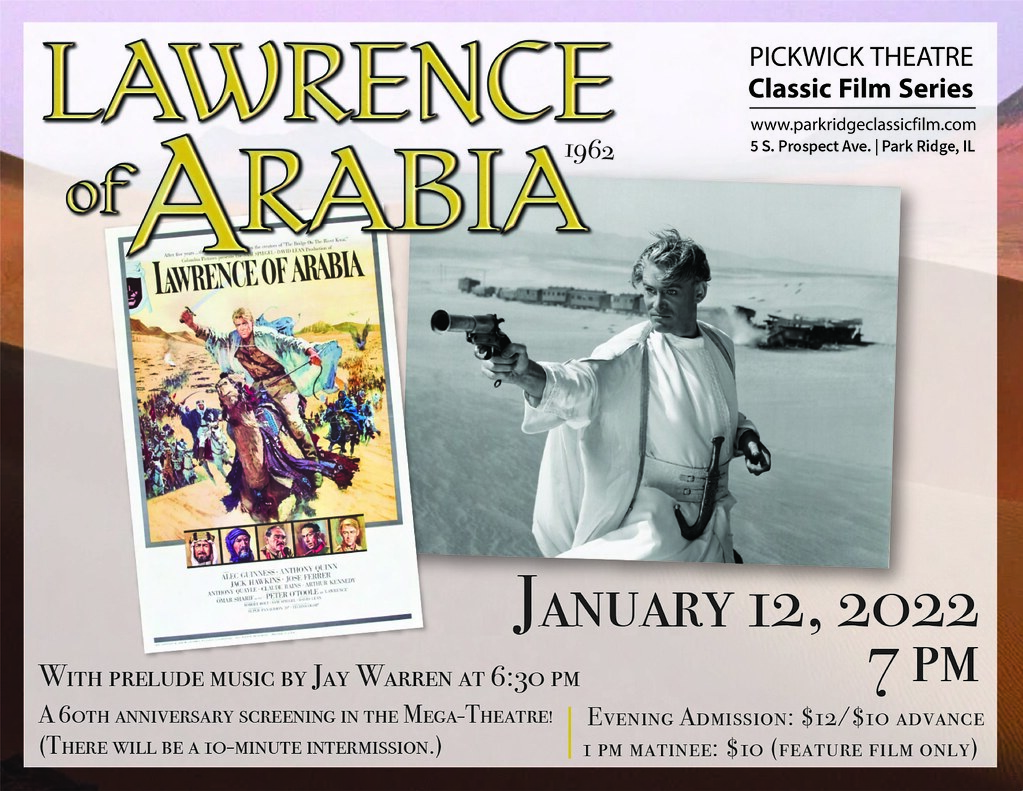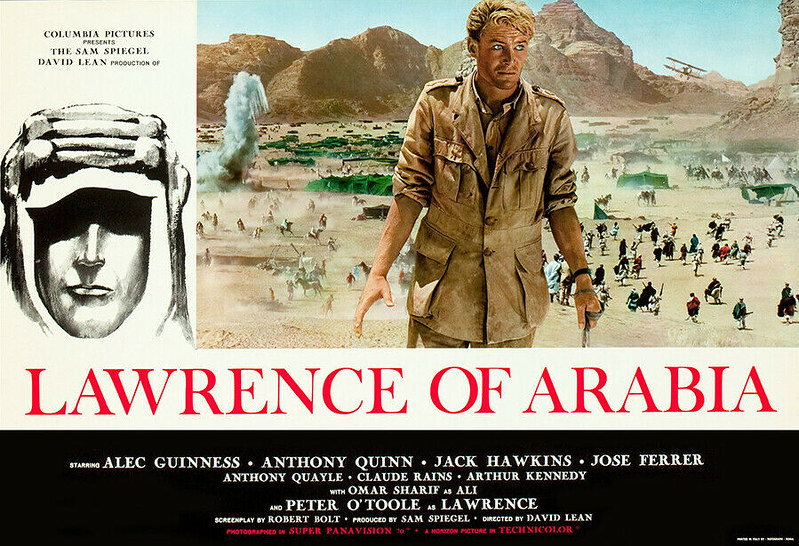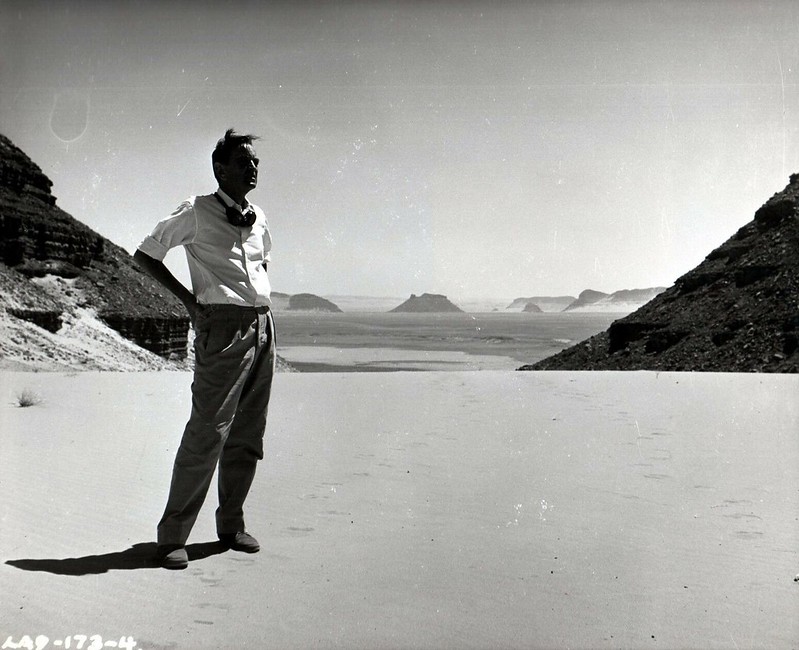WHAT: Lawrence of Arabia (1962) 60th anniversary (Restored, 4K DCP)
WHEN: January 12, 2022 1 PM & 7 PM
WHERE: Pickwick Theatre, Park Ridge, IL
WHAT ELSE: Organist Jay Warren performs pre-show music at 6:30 PM!
HOW MUCH: $12/$10 advance (Click Here!) or $10 for the 1 PM matinee
NOTE: There will be a 10-minute intermission.
“Romantic landscapes, august landscapes– one has seen these often enough on the screen. This is something else. The sun rising on the rim of blood-orange sand, dust storms like the smoke-trails of a djinn; the shapes of infinity, the colours of heat– I think it is the first time for the cinema to communicate ecstasy. Lawrence of Arabia is full of such beauties, and I can’t refrain from singing out the ambush of a train-load of horses and the capture in particular of one proud milk-white creature– a passage which might be out of Homer. Lawrence of Arabia taken as a whole is a genuine, sometimes even a profound interpretation of character. And that alone, even without the great aesthetic beauties, would make the film unique in the cinema of historical reconstruction.” ~ Dilys Powell, Sunday Times, December 16, 1962
“Well, I’ve always been fascinated by these English nuts. And Lawrence was a nut, of the most wonderful kind.” ~David Lean
In honor of Lawrence of Arabia‘s 60th anniversary, the Pickwick Theatre Classic Film Series will proudly present the film on Wednesday, January 12, 2022. For those interested in the production of this fascinating motion picture, I highly recommend reading the definitive history, The Making of David Lean’s Lawrence of Arabia (1994), by Adrian Turner. The book is out-of-print and hard to find, but you can get it through your local library’s inter-library loan. It’s well worth your time. However, for the purposes of our screening at the Pickwick, a detailed history of the film’s creation might not necessarily entice an audience to come out during a pandemic. I have, therefore, distilled the reasons why you should to the following…
1) The Mega-Theatre Experience: This is not a film you watch on your phone, tablet, or computer. Nor is it anything that should be streamed on your TV screen. Lawrence of Arabia is a film– the true measure of an “epic”– that needs to be experienced on a large screen. Fortunately, the Pickwick Theatre has the largest in the Chicagoland area. The auditorium seats over 800, and since we’ve only averaged about 200 for the evening screenings, there is plenty of room to sit away from others. There is even more space available at the 1 PM matinee, so feel free to take advantage. Unlike the local AMCs, you don’t have to worry about someone being assigned to the seat next to you! This will be the only time The Pickwick Theatre Classic Film Series will present this magnificent film, so catch it while you can. In addition, you can hear organist Jay Warren perform pre-show music on the Mighty Wurlitzer starting at 6:30 PM.
2) Best Picture Winner: Lawrence of Arabia was honored as the Best Picture of 1962. In addition to the top prize, it also won Academy Awards for Best Director, Best Art Direction, Best Cinematography, Best Editing, Best Musical Score and Best Sound. In other words, it has a lot going for it.
3) David Lean: One of the master storytellers in cinema, Lean is a filmmaker we’ve taken pride in honoring at the Pickwick Theatre Classic Film Series. Known for directing such classics as Brief Encounter, Great Expectations and The Bridge on the River Kwai, David Lean turned Lawrence of Arabia into the apotheosis of his career. A film about identity and destiny, Lawrence was shot over the course of fourteen months in Jordan, Spain, Morocco and Britain. One of the most memorable locations in the film is Wadi Rum in southern Jordan. Lean’s use of this setting recalls John Ford’s Westerns in Monument Valley. After the film’s premiere, Lawrence of Arabia was gradually edited down by as much as 20 minutes. In the late 1980s, a major restoration produced one of the very first “Director’s Cuts.” We will be screening the complete 222-minute version.
4) The Cast: Featuring Peter O’Toole as T.E. Lawrence, this was arguably the best role of his career. The screenplay, however, did not focus merely on the heroics of the character but rather on his psychological make-up. O’Toole’s complex performance brought an emotional depth to the part. Others in the cast include Alec Guinness as Prince Faisal, Omar Sharif as Sherif Ali, Anthony Quinn as Auda abu Tayi, Jack Hawkins as General Allenby, Jose Ferrer as the Turkish Bey, Anthony Quayle as Colonel Brighton, and Arthur Kennedy as Jackson Bentley (a character based on Lowell Thomas). A special mention goes to Claude Rains, one of the screen’s greatest actors, who plays the diplomat Dryden (a fictional character combining aspects of real-life figures close to Lawrence).
5) The Cinematography: The British Freddie Young was one of cinema’s great cameramen. Despite his experience prior to the making of this film, Young was not Lean’s first choice. Lean had wanted an American cameraman who would be more experienced with Super Panavision 70 (actually 65mm with 5mm for the stereophonic soundtracks). Young mastered the wide-screen format and would go on to win Oscars for all three David Lean films on which he worked– the others being Doctor Zhivago and Ryan’s Daughter. He was also the cinematographer on the James Bond adventure, You Only Live Twice, which we’ve also presented. The visuals in the film are gorgeous and feature many indelible images, including the famous “mirage” shot in which Sherif Ali (Omar Sharif) makes his entrance upon a camel. (This was done in one take using a 450mm telephoto lens.) Admirers of the film will also recall the pictorial surrealism of the image of a ship moving through the sand dunes.
6) Maurice Jarre: Lawrence of Arabia is known not just for its visual spendor but for its soundtrack, particularly its main title which has become synonymous with epic motion pictures. As is so often the case with film composers, Jarre had to operate in a short period of time– eight weeks– to compose and orchestrate the entire score. He was not the first choice by the producer, but he proved to be the best choice.
7) Someone You Should Know: Most people today, particularly younger generations, would be hard-pressed to make any comment about T.E. Lawrence or his role in history. A few might know he united the Arabs during World War I, but that would be about it. Lawrence was very much an enigma, then and now– a man of contradictions and conflicts. The film captures this. It is, however, a dramatization of Lawrence’s life and often times strays from actual fact. Lawrence’s youngest brother and executor of the estate, A.W. Lawrence, was once famously quoted as saying he didn’t even recognize his own brother in the film. Although A.W. had approved of the original screenplay by Michael Wilson– which followed T.E.’s autobiographical account of the Arab Revolt, Seven Pillars of Wisdom, more faithfully– he was appalled by the revisions made by screenwriter (and playwright) Robert Bolt. Whereas Wilson had been faithful to the political side of Lawrence’s career, Bolt’s script examined the psychological, masochistic side of Lawrence. As a result, the film was not allowed to use the title Seven Pillars of Wisdom. But Lawrence of Arabia was made for dramatic purposes, not historical, and it certainly reinvigorated interest in one of the most famous figures in British military history.
8) More Parking: The “Library Lot”– actually the City’s– reopened mid-December. Patrons no longer have to look for street parking or walk over from other parts of town. The new lot is across the street from the theatre and parking is free.
9) Support Theatre & Staff: Your patronage supports our theatre during a difficult time. Not only does the purchase of a ticket help business, but your visits to concessions do as well. There will be a ten-minute intermission during both screenings, and after spending two hours in the desert, you may want to saunter up to the bar in the “officers’ club” (our concession area) and order a “lemonade”– or the next best thing they have.
10) Steven Spielberg’s Favorite Film: Steven Spielberg, the director of numerous blockbusters, often speaks glowingly of David Lean and considers Lawrence of Arabia his favorite film– one of a handful of classics he periodically watches before undertaking a new project. There are many references to David Lean in his films, including Indiana Jones and the Last Crusade. Interestingly, The Last Crusade was shot in Petra, Jordan– a location initially considered by David Lean for Lawrence of Arabia.


